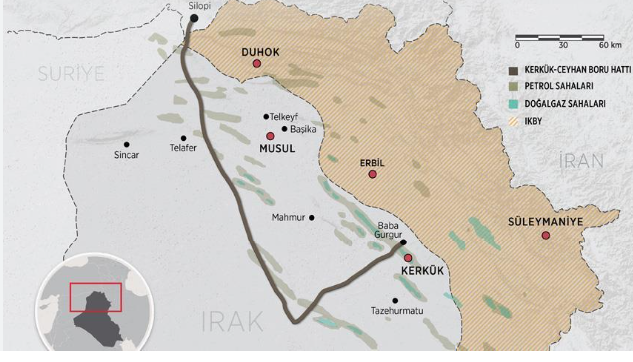Iraq halted 450,000 barrels per day (bpd) of crude exports from the semi-autonomous Kurdistan region and northern Kirkuk fields on Saturday, an oil official told Reuters, after the country won a longstanding arbitration case against Turkey.
In a case dating from 2014, Baghdad claimed that Turkey violated a joint agreement by allowing the Kurdistan Regional Government (KRG) to export oil through a pipeline to the Turkish port of Ceyhan. Baghdad deems KRG exports as illegal.
“Iraq was officially informed by the International Court of Arbitration final ruling on Thursday and it was in favor of Iraq,” a senior oil ministry official said.
Turkey informed Iraq that it will respect the arbitration ruling, a source said.
Turkish shipping officials told Iraqi employees at Turkey’s Ceyhan oil export hub that no ship will be allowed to load Kurdish crude without the approval of the Iraqi government, according to a document seen by Reuters.
Turkey subsequently halted the pumping of Iraqi crude from the pipeline that leads to Ceyhan, a separate document seen by Reuters showed.
On Saturday, Iraq stopped pumping oil through its side of the pipeline which runs from its northern Kirkuk oil fields, one of the officials told Reuters.
Iraq had been pumping 370,000 bpd of KRG crude and 75,000 bpd of federal crude through the pipeline before it was halted, according to a source familiar with pipeline operations.
“A delegation from the oil ministry will travel to Turkey soon to meet energy officials to agree on new mechanism to export Iraq’s northern crude oil in line with the arbitration ruling,” a second oil ministry official said.
The Kurdish oil was largely bought by Israeli operators and was one of the few remaining venues for the cash strapped Kurdish region to make end meet. Turkish energy experts claim Baghdad is not interested in using the Kirkuk-Baku pipeline anymore, preferring instead to route its output to a trunk pipeline connecting the country to Iran ports.
The decision to stop the oil flow will have a very minor impact on Mediterranean crude supplies or Turkey’s external deficit.
Comments by PATurkey
Follow our English language YouTube videos @ REAL TURKEY: https://www.youtube.com/channel/UCKpFJB4GFiNkhmpVZQ_d9Rg
And content at Twitter: @AtillaEng
Facebook: Real Turkey Channel: https://www.facebook.com/realturkeychannel/
